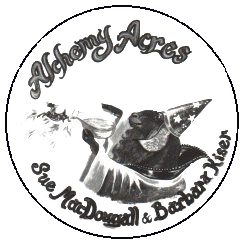
















This month I'm going to discuss "crap". Now I'm not talking about the chicken shit or bull shit with which we must all occasionally deal. No Siree!! I'm talking about the manure our loyal charges so dutifully produce day after day. When we think of our animals, we think of the milk they produce, the kids we receive, and the affection they so generously provide. The "crap" is generally considered to be the price we pay for the former gifts. Actually, the manure is also a beneficial product.
Here's a fact that I'll bet you didn't know. The average goat produces about 10 pounds of manure per day. That's figuring the feces plus bedding plus wasted feed. That amounts to a ton and a half of manure per year per goat (Egad - no wonder I'm always so pooped from stall-cleaning). Disposal of the manure can be quite nettlesome for large herds in particular.
However, we should put this into perspective. In many parts of the world, animal wastes serve useful purposes. Approximately 40% of the farmers of the world depend largely on animal wastes to enhance soil fertility. Over the short term, a chemical fertilizer can better increase farm yields. But in the long term, a manure will enhance the aggregate crumb structure, and soil permeability, which aids in cultivation. Add that to the nutrients added to the soil by the animal wastes, and you have a very desirable product. I've oft-time had people come out to my farm and clean out my stalls just to get the fertilizer. I find it interesting that the folks who more appreciate the natural fertilizer are generally the older farmers. Depending on where you live, and your prospective customers, you could be overlooking a real "gold mine".
I've seen all sorts of schemes for composting the manure into soil. I've always been struck by the small size of the bins proposed by those systems. For the amounts of manure about which we're talking, these schemes seem a bit impractical to me. I take a very simple (and cheap) approach to the dilema. I haul the "goodies off behind an old, unused shed. I just keep piling it up - don't even turn it. The pile stews year in and year out. Oddly enough, there is not a stench - probably because composting is a heat-producing process. Also, the shed is a ways from the house. After a year or two, I dig the soil out from the bottom of the pile. It is always a thing of beauty - rich, black humous that I can put in my planting beds and pots. In the Fall of the year, I don't bother with the compost pile, but spread the animal "offerings" directly onto the garden as I daily clean the barn. When I have a goodly amount of manure built up, I till it into the garden plots. I can repeat this during the Winter, and by Spring planting, the garden is ready for a bountiful yield. My native soil has been changed from sticky clay to a nice, loose, rich, easily tilled soil. And I have more produce than I can pack away.
This fertilizer is pre-paid, so-to-speak. Why should any of us purchase commercial fertilizers when our beloved charges so generously provide for us. I'm all for modern innovations. But this is one product on which I don't believe we can improve. This bountiful by-product of our goat-keeping is a valuable fertilizer, as well as a soil conditioner. Its a product for home and for resale (I've had city-folk leave the farm with the biggest, goofiest grins just for having had the privilege of carrying off a feedsack or two of manure). So lets have a hearty "Hurrah" for the "crap" in our lives.







